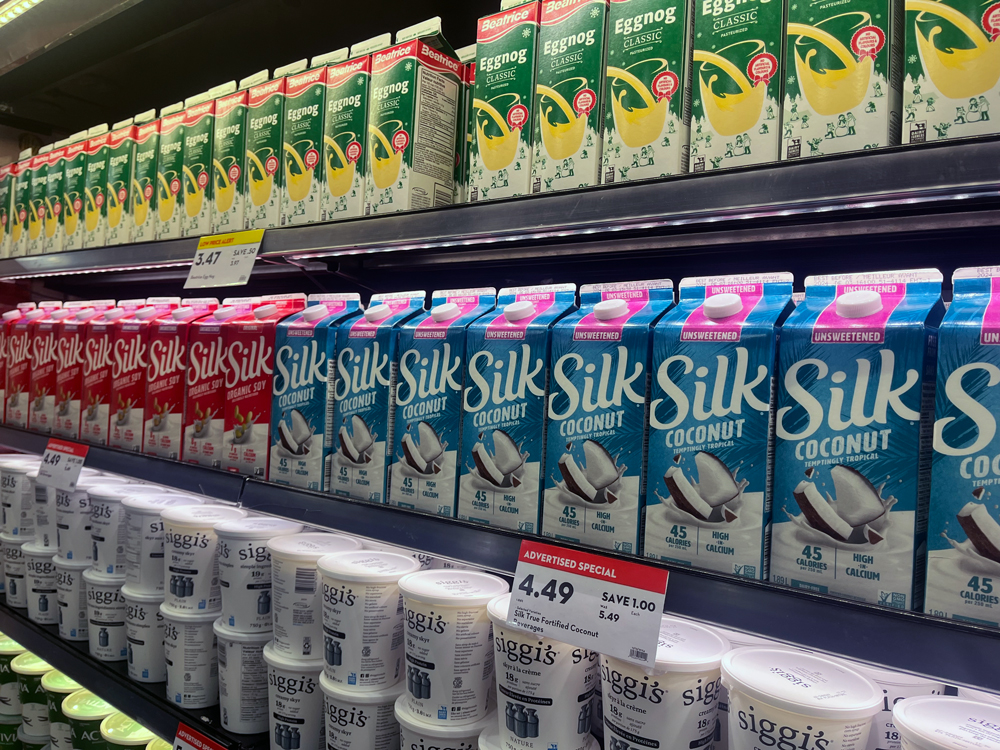
Listen to the whole story
The latest food product to be recalled, Hestars brand of Temple Street Crispy Rice, was recalled due to the undeclared presence of milk as noted on the Canadian Food Inspection Agency (CFIA) recall page.
Food recall incidents have been on the rise over the past few years according to the CFIA. One hundred seventy-two food recall incidents have been issued in the fiscal year of 2023-2024, compared to 153 incidents in 2022-2023 and 137 in 2021-2022.
Class two recalls have also been increasing. Eighty-one class two recalls have been issued in the fiscal 2023-2024 year compared to 76 class two recalls in 2022-2023 and 49 in 2021-2022.
A class two recall is “a situation in which the use of, or exposure to, a product may cause temporary adverse health consequences or where the probability of serious adverse health consequences is remote,” as defined by the Government of Canada.
Common products that consumers buy have recently been affected and fall into the class two category. Various brands of bread and buns were recalled on Nov.1 due to pieces of metal being found in the product, and a brand of italian cheese was recalled on Oct. 30 due to “generic E-coli”.
A food recall is issued “at any point in the supply chain as a risk mitigation action,” according to the Government of Canada. “It is the responsibility of industry to effectively remove the recalled food from the marketplace.”
Food recalls can happen due to viruses, undeclared ingredients, parasites or physical fragments being found in the product and are found through many methods ranging from consumer complaints, routine test results or another country recalling a product according to the Government of Canada.
Naomi Herberg had bought the whole grain blueberry waffles from Whole Foods for her son only to find out that they had been recalled due to listeria.
“I think I saw it on television,” she said. “My initial reaction was, that could not possibly be the brand that I bought.”
Herberg keeps a calendar of when her son initially consumed the now recalled product to keep track of when he was first exposed to the virus.
“It could be days and days…until you know you’re home free,” she said.
“It’s a long time that you have to concern yourself with it in the back of your mind because if [my son] starts showing symptoms, [I] have to be aware that it could be listeria.”
Symptoms of listeria can appear from anywhere as little as a few hours to a few months after ingestion, according to the Government of Canada.
“We as consumers…expect brands to provide safe foods, and a recall can really tarnish a brand’s image, especially if there are multiple recalls happening within a short period of time,” Jenn Lee, assistant professor at the school of nutrition at Toronto Metropolitan University (TMU) said.
“We now live in a day and age where we don’t actually see all the steps that are involved in bringing foods, you know, from farm to table, and most people just interact with, sort of the final product…when it’s available at the grocery store,” she said.
“A lot of the food supply chain …seems very opaque and not as transparent, so that limited visibility, it can really breed mistrust to begin with.”
“Food safety starts on the farm and ends only once the product is consumed,” Mary Ann Ferrer, food science professor at the University of Guelph says.
“A small failure in a food safety system allows for a hazard to ‘leak’ into the food chain. In addition, some hazards, like microbial hazards evolve over time. For example, a new strain of a pathogen might emerge or become more frequent, and that strain might not be controlled by the existing preventive control. Contamination can happen also after the food leaves the processing plant; the cold chain might fall; the deli where the food is served might be a source of contamination.”
Due to the limitations of testing, Keith Warriner, food science professor at the University of Guelph compares this process to “finding a needle in a haystack.”
“Incidences can occur. On other occasions the company may have made errors in risk assessment or mislabeled products,” he says.
“Some would say that recalls show the food safety system is working but others would argue that it shows the limitation of current approaches.”
Even though instances can occur when it comes to recalled products, Lee says that Canada has “one of the strictest food safety and nutritional quality regulations in the world.”
“Generally speaking, because we have these regulations and standards, our food supply is safer as a result, compared to a lot of other countries as well,” she said.
If you or a loved one has ingested a recalled food product, call your doctor if you start to experience symptoms.
Additionally, properly dispose of the product or return the product back to where you first purchased it as stated on the Government of Canada food recall page.
Reporter for TMU - Master of Journalism
This article may have been created with the use of AI tools such as Google Docs, Grammarly, and/or Otter.ai for transcription.

